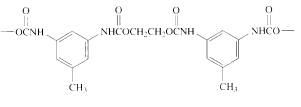
Concept explainers
Draw short segments of the

(a)
Interpretation:
The short segment of polymer obtained from the given monomer has to be drawn and also have to indicate whether it is a chain growth or step growth polymer.
Answer to Problem 24P
The short segment of given monomer is shown below and the monomer undergoes chain growth polymerization.

Explanation of Solution
Given the monomer is
The short segment of polymer obtained from this monomer is given below.

The polymer formed is a Chain growth polymer because monomer addition occurs at the end of the chain.
(b)
Interpretation:
The short segment of polymer obtained from the given monomer has to be drawn and also have to indicate whether it is a chain growth or step growth polymer.
Answer to Problem 24P
The short segment of given monomer is shown below and the monomer undergoes chain growth polymerization.

Explanation of Solution
Given the monomer is
The short segment of polymer obtained from this monomer is given below.

The polymer formed is a Chain growth polymer because monomer addition occurs at the end of the chain.
(c)
Interpretation:
The short segment of polymer obtained from the given monomer has to be drawn and also have to indicate whether it is a chain growth or step growth polymer.
Answer to Problem 24P
The short segment of given monomer is shown below and the monomer undergoes step growth polymerization.

Explanation of Solution
Given the monomer is

The short segment of polymer obtained from this monomer is given below.

The polymer formed is a Step growth polymer because monomer addition occurs not at the end of the chain and these polymers are formed by combining monomers by removing small molecules of water or alcohol.
(d)
Interpretation:
The short segment of polymer obtained from the given monomer has to be drawn and also have to indicate whether it is a chain growth or step growth polymer.
Answer to Problem 24P
The short segment of given monomer is shown below and the monomer undergoes step growth polymerization.

Explanation of Solution
Given the monomer is

The short segment of polymer obtained from this monomer is given below.

The polymer formed is a step growth polymer because monomer addition occurs not at the end of the chain and these polymers are formed by combining monomers by removing small molecules of water or alcohol.
(e)
Interpretation:
The short segment of polymer obtained from the given monomer has to be drawn and also have to indicate whether it is a chain growth or step growth polymer.
Answer to Problem 24P
The short segment of given monomer is shown below and the monomer undergoes step growth polymerization.

Explanation of Solution
Polymers are formed from linking small units called monomers and they are classified into Chain growth polymers and Step growth polymers.
Given the monomer is

The short segment of polymer obtained from this monomer is given below.

The polymer formed is a Step growth polymer because monomer addition occurs not at the end of the chain and these polymers are formed by combining monomers by removing small molecules of water or alcohol.
Want to see more full solutions like this?
Chapter 27 Solutions
Organic Chemistry; Organic Chemistry Study Guide A Format: Kit/package/shrinkwrap
- please help with synthesisarrow_forward10. Stereochemistry. Assign R/S stereochemistry for the chiral center indicated on the following compound. In order to recieve full credit, you MUST SHOW YOUR WORK! H₂N CI OH CI カー 11. () Stereochemistry. Draw all possible stereoisomers of the following compound. Assign R/S configurations for all stereoisomers and indicate the relationship between each as enantiomer, diastereomer, or meso. NH2 H HNH, -18arrow_forwardb) 8. Indicate whether the following carbocation rearrangements are likely to occur Please explain your rational using 10 words or less not likely to occur • The double bond is still in the Same position + Likely to oc occur WHY? -3 H3C Brave Chair Conformers. Draw the chair conformer of the following substituted cyclohexane. Peform a RING FLIP and indicate the most stable conformation and briefly explain why using 20 words or less. CI 2 -cobs ?? MUST INDICATE H -2 -2 Br EQ Cl OR AT Br H& most stable WHY? - 4arrow_forward
- CH 12 Conformational Analysis. Draw all 6 conformers (one above each letter) of the compound below looking down the indicated bond. Write the letter of the conformer with the HIGHEST and LOWEST in energies on the lines provided. NOTE: Conformer A MUST be the specific conformer of the structure as drawn below -4 NOT HOH OH 3 Conformer A: Br OH A Samo Br H 04 Br H H3 CH₂ H anti stagere Br CH clipsed H Brott H IV H MISSING 2 -2 B C D E F X 6 Conformer with HIGHEST ENERGY: 13. (1 structure LOWEST ENERGY: Nomenclature. a) Give the systematic (IUPAC) name structure. b) Draw the corresponding to this name. HINT: Do not forget to indicate stereochemistry when applicable. a) ८८ 2 "Br {t༐B,gt)-bemn€-nehpརི་ཚ༐lnoa Parent name (noname) 4 Bromo Sub = 2-methylethyl-4 Bromo nonane b) (3R,4S)-3-chloro-4-ethyl-2,7-dimethyloctane # -2 -2arrow_forwardin the scope of the SCH4U course! please show all steps as im still learning how to format my answers in the format given, thank you!arrow_forwardhelp me solve this HWarrow_forward
- Molecules of the form AH2 can exist in two potential geometries: linear or bent. Construct molecular orbital diagrams for linear and bent CH2. Identify the relevant point group, include all of the appropriate symmetry labels and pictures, and fill in the electrons. Which geometry would you predict to be more stable, and why? (Please draw out the diagram and explain)arrow_forwardIndicate the variation in conductivity with concentration in solutions of strong electrolytes and weak electrolytes.arrow_forwardThe molar conductivity of a very dilute solution of NaCl has been determined. If it is diluted to one-fourth of the initial concentration, qualitatively explain how the molar conductivity of the new solution will compare with the first.arrow_forward
 Introductory Chemistry: An Active Learning Approa...ChemistryISBN:9781305079250Author:Mark S. Cracolice, Ed PetersPublisher:Cengage Learning
Introductory Chemistry: An Active Learning Approa...ChemistryISBN:9781305079250Author:Mark S. Cracolice, Ed PetersPublisher:Cengage Learning Chemistry: Principles and PracticeChemistryISBN:9780534420123Author:Daniel L. Reger, Scott R. Goode, David W. Ball, Edward MercerPublisher:Cengage Learning
Chemistry: Principles and PracticeChemistryISBN:9780534420123Author:Daniel L. Reger, Scott R. Goode, David W. Ball, Edward MercerPublisher:Cengage Learning
 Organic ChemistryChemistryISBN:9781305580350Author:William H. Brown, Brent L. Iverson, Eric Anslyn, Christopher S. FootePublisher:Cengage Learning
Organic ChemistryChemistryISBN:9781305580350Author:William H. Brown, Brent L. Iverson, Eric Anslyn, Christopher S. FootePublisher:Cengage Learning Chemistry: The Molecular ScienceChemistryISBN:9781285199047Author:John W. Moore, Conrad L. StanitskiPublisher:Cengage Learning
Chemistry: The Molecular ScienceChemistryISBN:9781285199047Author:John W. Moore, Conrad L. StanitskiPublisher:Cengage Learning





